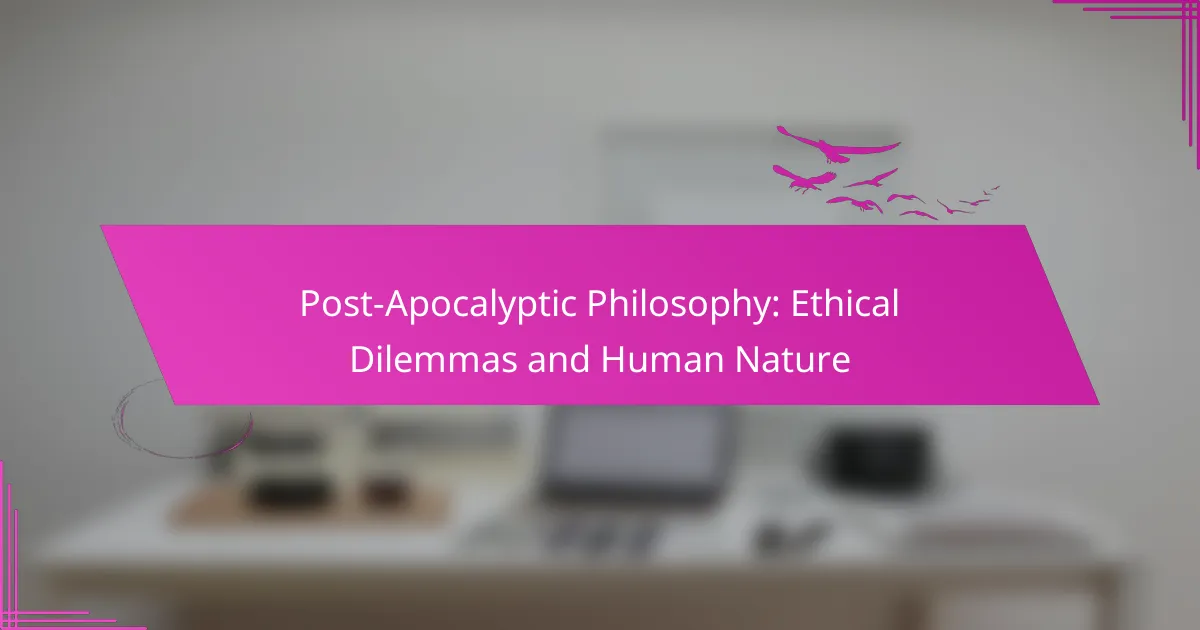Post-apocalyptic philosophy examines the ethical dilemmas that arise when societal norms collapse. It explores survival versus morality, resource allocation, and the justification of violence. The evolution of human nature under extreme stress reveals both resilience and moral ambiguity. Cultural narratives shed light on diverse ethical frameworks, emphasizing the need for cooperation and accountability in resource-scarce environments.
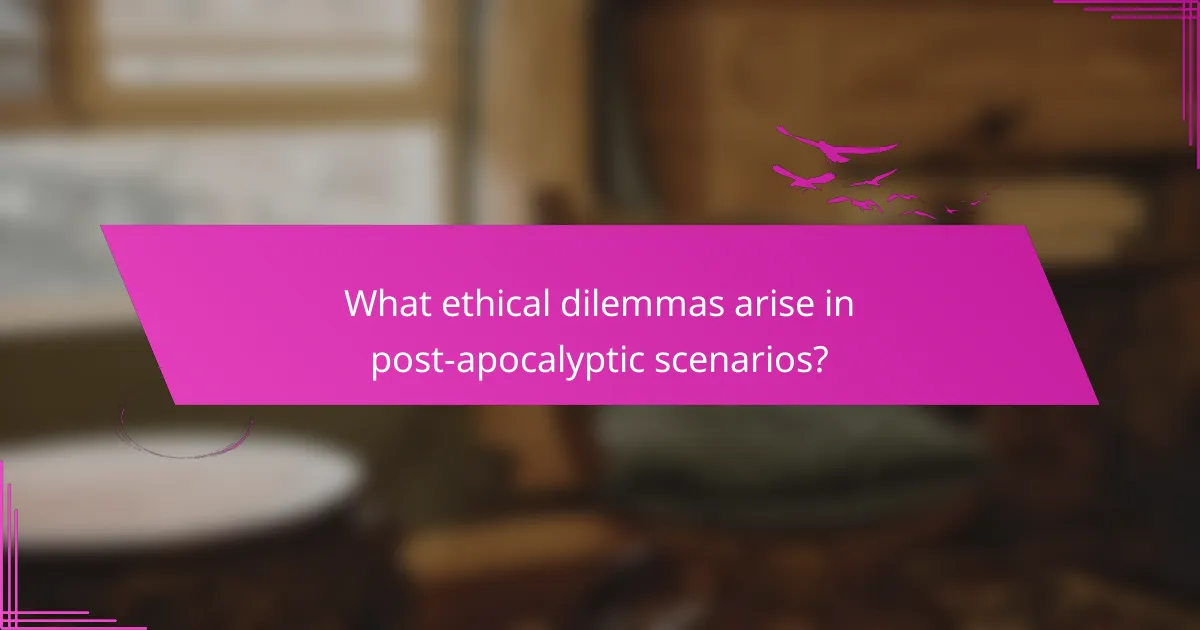
What ethical dilemmas arise in post-apocalyptic scenarios?
Post-apocalyptic scenarios present complex ethical dilemmas that challenge human nature. Key issues include survival versus morality, resource allocation, and the justification of violence. Individuals must navigate decisions that weigh personal survival against communal responsibility. The scarcity of resources often leads to conflicts over ownership and distribution, raising questions about fairness and equity. Additionally, the breakdown of societal norms can lead to a moral ambiguity where traditional ethics may no longer apply. Ultimately, these dilemmas force individuals to confront their values and the essence of humanity in extreme conditions.
How do survival instincts shape moral decisions?
Survival instincts significantly influence moral decisions in post-apocalyptic scenarios. Individuals often prioritize self-preservation and the welfare of their immediate group over broader ethical considerations. This instinct can lead to actions that contradict societal norms, such as stealing for survival or harming others to protect loved ones.
In extreme situations, survival instincts may override traditional moral frameworks, prompting individuals to make choices based on immediate needs rather than established ethical standards. For example, a person may choose to lie or betray others to secure resources.
Such dilemmas reveal the tension between innate survival drives and learned moral values. The unique attribute of survival instincts is their ability to reshape ethical reasoning under duress. This dynamic highlights the complexity of human nature when faced with existential threats.
Ultimately, understanding how survival instincts shape moral decisions can provide insights into human behavior in crisis situations, illustrating the delicate balance between ethics and survival.
Which philosophical theories apply to post-apocalyptic ethics?
Post-apocalyptic ethics can be informed by several philosophical theories, including utilitarianism, deontology, and virtue ethics. Utilitarianism focuses on maximizing overall happiness, which may guide decisions in resource allocation. Deontology emphasizes moral duties and rules, shaping ethical behavior even in dire circumstances. Virtue ethics centres on character and moral virtues, encouraging individuals to act with integrity and compassion amidst chaos. Each theory provides a framework for addressing the ethical dilemmas that arise in post-apocalyptic scenarios, reflecting human nature’s complexities.
What role does community play in ethical choices?
Community plays a crucial role in shaping ethical choices through shared values and collective decision-making. In a post-apocalyptic context, individuals rely on community bonds for moral guidance and support. The social fabric influences perceptions of right and wrong, often leading to a consensus on ethical dilemmas. For example, survival strategies may prioritize group welfare over individual desires, illustrating the power of communal ethics. Additionally, communities can foster resilience, encouraging members to uphold ethical standards even in challenging circumstances.
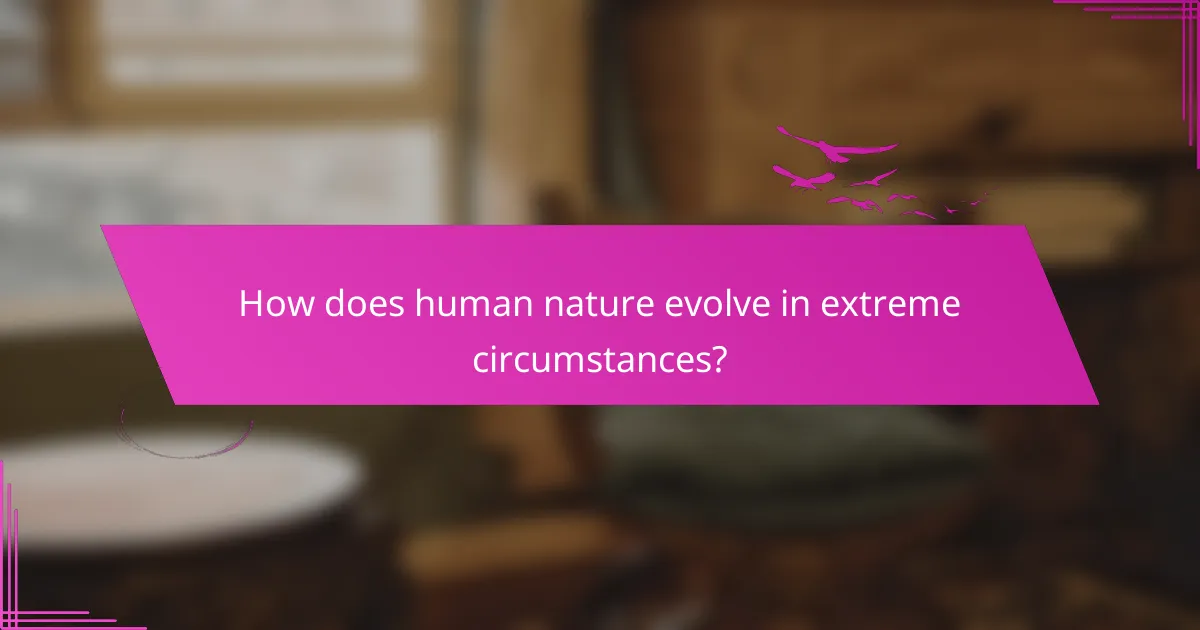
How does human nature evolve in extreme circumstances?
Human nature evolves significantly in extreme circumstances, often revealing both resilience and moral ambiguity. In post-apocalyptic scenarios, survival instincts can dominate ethical considerations, leading to complex dilemmas. Individuals may prioritize self-preservation over communal values, challenging established norms of behavior.
Research indicates that extreme stress can trigger adaptive traits, such as increased cooperation among groups facing common threats. This unique attribute of human nature highlights the capacity for empathy even in dire situations. However, rare instances of betrayal and violence also emerge, illustrating the duality of human behavior under pressure.
The evolution of human nature in such contexts underscores the philosophical debates surrounding morality and ethics. As societies collapse, the redefinition of right and wrong becomes a critical concern, reflecting deeper questions about human identity and social contracts.
What psychological effects do apocalyptic events have on individuals?
Apocalyptic events can lead to profound psychological effects on individuals, including anxiety, trauma, and existential crises. These experiences often challenge personal beliefs and ethical frameworks.
Survival instincts may override moral considerations, leading to ethical dilemmas. Individuals may prioritize self-preservation over community welfare, highlighting a unique aspect of human nature under extreme stress.
As a result, social bonds may weaken, causing isolation and despair. The psychological toll can manifest as depression, PTSD, or heightened aggression.
In contrast, some individuals may find resilience and purpose, leading to rare instances of altruism and community rebuilding. This duality reflects the complex interplay between human nature and the moral challenges posed by catastrophic scenarios.
How do social structures change in a post-apocalyptic world?
Social structures in a post-apocalyptic world often shift towards more communal and survival-oriented frameworks. Traditional hierarchies may dissolve, leading to egalitarian systems based on cooperation and resource sharing.
In such scenarios, leadership often emerges from necessity rather than authority, with individuals gaining influence through skills and decision-making abilities. For example, a person adept at finding food may become a leader, while those with medical knowledge may hold significant power in community health.
Additionally, ethical dilemmas arise as survival often conflicts with moral considerations. Decisions about resource allocation can lead to tension, forcing communities to navigate complex social dynamics. The unique attribute of human adaptability becomes crucial, as societies must redefine norms and values to maintain cohesion in the face of adversity.
Overall, the change in social structures emphasizes resilience, adaptability, and the re-evaluation of human nature in extreme conditions.
Which traits become more prominent in survival situations?
In survival situations, traits like adaptability, resourcefulness, and moral flexibility become more prominent. Individuals often prioritize immediate survival over ethical considerations. Adaptability allows for quick responses to changing environments. Resourcefulness enables the use of limited supplies creatively. Moral flexibility may lead to difficult decisions that challenge personal ethics for survival. These traits reflect human nature in extreme circumstances, highlighting the tension between instinct and morality.
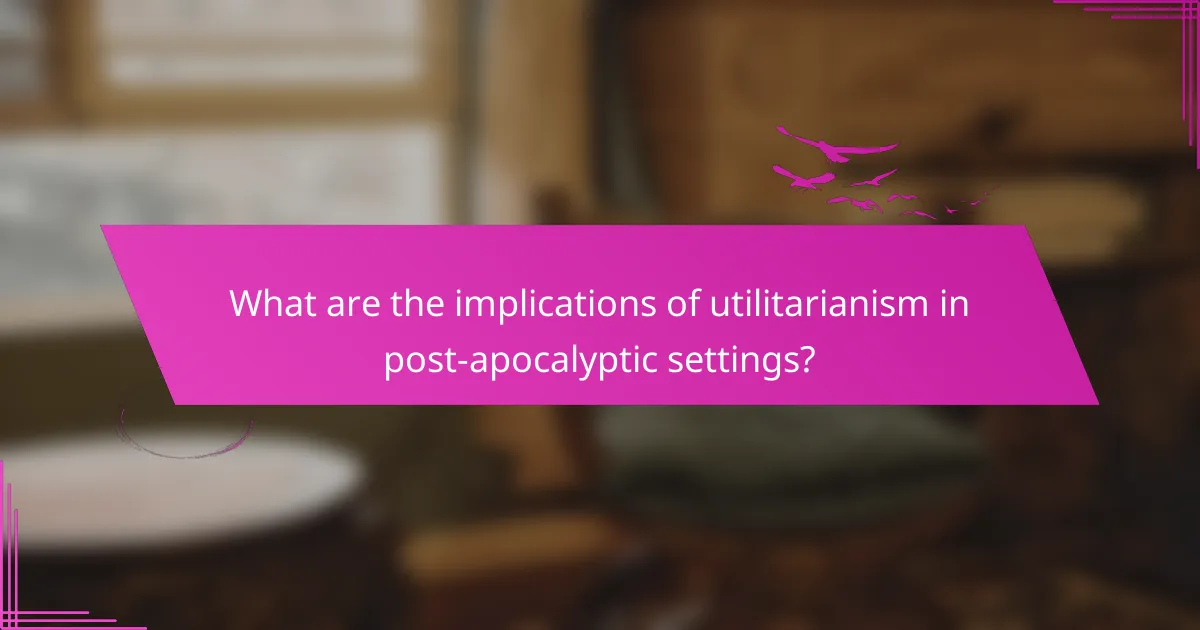
What are the implications of utilitarianism in post-apocalyptic settings?
Utilitarianism in post-apocalyptic settings emphasizes maximizing overall well-being despite moral dilemmas. Decisions often prioritize survival and resource distribution, leading to ethical conflicts. The unique attribute of utilitarianism in such contexts is its focus on collective benefit over individual rights, which can justify harsh actions for the greater good. In extreme conditions, rare scenarios arise where utilitarian principles clash with human empathy, challenging moral boundaries and human nature.
How do utilitarian principles guide resource allocation?
Utilitarian principles guide resource allocation by prioritizing actions that maximize overall happiness and minimize suffering. In post-apocalyptic scenarios, these principles can lead to difficult ethical dilemmas. Decision-makers must evaluate the needs of the community against available resources, often sacrificing individual desires for the greater good. This approach emphasizes collective well-being, reflecting a unique attribute of utilitarianism: its focus on outcomes rather than intentions. Resource distribution may favour essential services, ensuring survival and stability in a challenging environment.
What challenges arise when applying utilitarianism to group dynamics?
Applying utilitarianism to group dynamics presents several challenges. One major issue is the difficulty in measuring collective happiness accurately. Individual preferences and needs often conflict, complicating the calculation of overall utility. Additionally, the potential for majority tyranny arises, where the desires of the majority overshadow the rights and needs of minority group members. This can lead to ethical dilemmas, as utilitarianism may justify harmful actions against a few for the perceived greater good. Furthermore, the long-term consequences of decisions may be unpredictable, making it challenging to assess their true utility. Balancing immediate benefits against future impacts complicates ethical decision-making in post-apocalyptic scenarios.
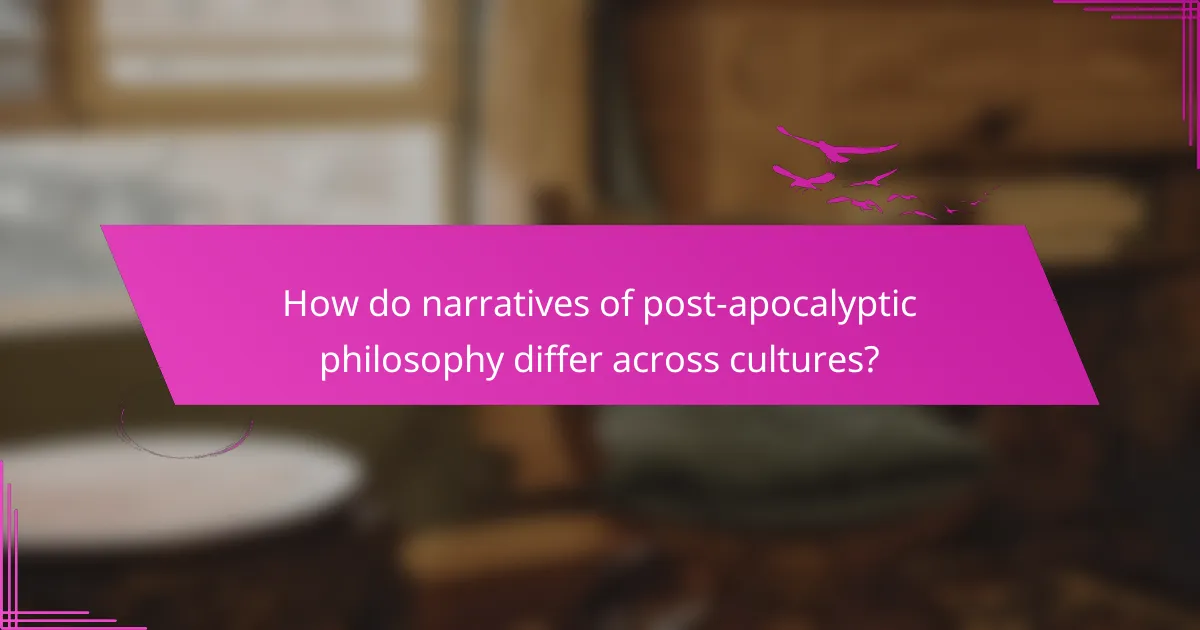
How do narratives of post-apocalyptic philosophy differ across cultures?
Narratives of post-apocalyptic philosophy vary significantly across cultures, reflecting diverse ethical dilemmas and views on human nature. In Western narratives, themes often focus on individualism, survival, and moral ambiguity. Characters frequently grapple with personal choices that challenge societal norms. Conversely, Eastern narratives may emphasize collectivism, harmony, and the interconnectedness of humanity. These stories often explore the impact of disaster on community bonds and ethical responsibilities.
For instance, in Japanese post-apocalyptic literature, there is a strong focus on nature and humility, reflecting cultural values of respect for the environment. In contrast, American narratives might prioritise technological themes and human resilience, showcasing the struggle against dystopian forces.
These cultural differences highlight unique attributes in ethical reasoning, shaping how societies envision human behavior in extreme circumstances. By analyzing these narratives, we gain insights into varying philosophical perspectives on morality, community, and survival in a post-apocalyptic world.
What are common themes in North American post-apocalyptic literature?
Common themes in North American post-apocalyptic literature include survival, moral dilemmas, and the fragility of civilization. These narratives often explore human nature under extreme conditions, highlighting ethical decisions that challenge characters’ values. For example, the struggle between individualism and community emerges as a central conflict. Additionally, the impact of technology and environmental degradation serves as a backdrop, questioning humanity’s relationship with nature. The unique attribute of these works is their ability to reflect contemporary societal anxieties, making them relevant to modern readers.
How do European perspectives on human nature influence philosophical discourse?
European perspectives on human nature significantly shape philosophical discourse by emphasizing ethical dilemmas in post-apocalyptic contexts. These perspectives often draw from historical philosophical traditions, such as existentialism and humanism, which explore the essence of humanity under extreme conditions.
For instance, European philosophers like Jean-Paul Sartre and Martin Heidegger have contributed to understanding human nature through concepts of freedom and existence. Their ideas prompt discussions about moral responsibility and the human condition when societal structures collapse.
Additionally, the influence of European thought encourages a critical examination of human behavior in crisis situations, highlighting themes of survival, cooperation, and moral ambiguity. This discourse fosters a deeper understanding of ethical frameworks that govern human actions in post-apocalyptic scenarios.
Ultimately, these philosophical inquiries challenge individuals to reflect on the nature of humanity, prompting essential questions about ethics, identity, and the human spirit in the face of adversity.
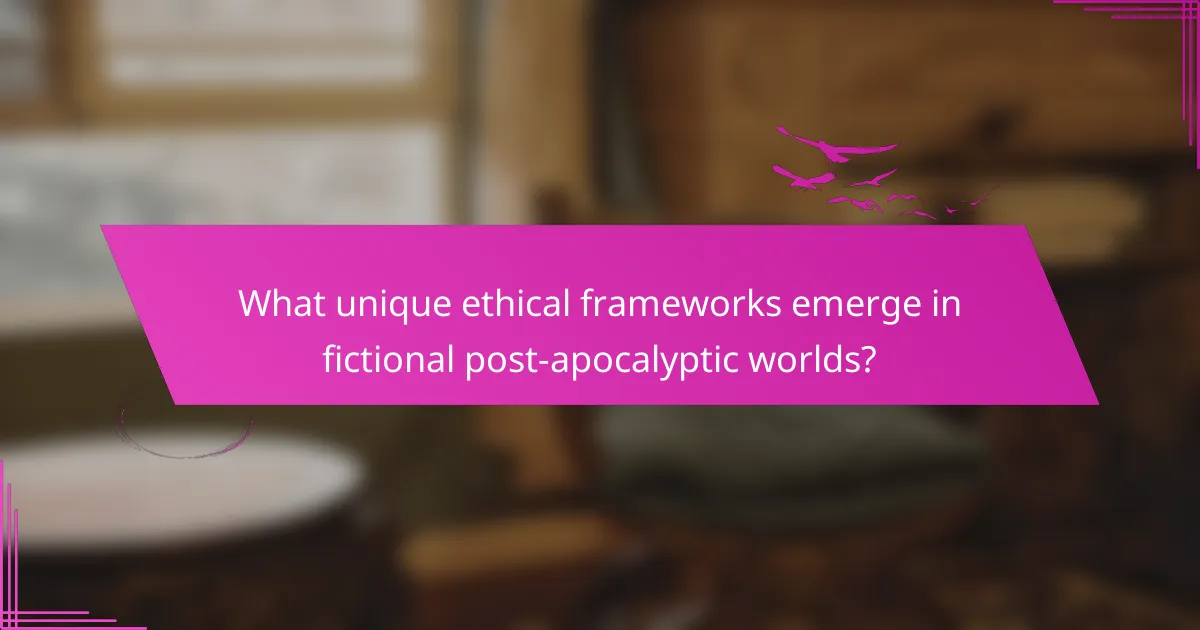
What unique ethical frameworks emerge in fictional post-apocalyptic worlds?
Unique ethical frameworks in fictional post-apocalyptic worlds often revolve around survival, community, and moral ambiguity. These narratives typically challenge traditional moral principles, emphasizing utilitarianism and the greater good. Characters frequently face dilemmas that test their humanity, such as sacrificing one for many or prioritizing personal loyalties over collective survival. Unique attributes emerge, like the emergence of new social contracts or the reinterpretation of justice in lawless societies. Such frameworks reflect humanity’s instinct to adapt ethics to extreme circumstances, highlighting resilience and moral complexity.
How do authors use dystopian settings to explore moral questions?
Authors use dystopian settings to probe moral questions by illustrating extreme scenarios that challenge human values. These narratives often depict societal collapse, prompting characters to confront ethical dilemmas like survival versus morality. The harsh realities of a post-apocalyptic world reveal unique attributes of human nature, such as resilience and selfishness. As a result, readers engage with profound philosophical themes, including the nature of good and evil, the importance of community, and the consequences of power. Through these explorations, dystopian literature serves as a mirror reflecting contemporary moral challenges.
Which characters exemplify complex moral dilemmas in these narratives?
Characters in post-apocalyptic narratives often face profound moral dilemmas. Examples include Rick Grimes from “The Walking Dead,” who navigates leadership and survival ethics, and the protagonists in “The Road,” who struggle with the morality of protecting loved ones versus the harsh realities of survival. These characters exemplify the conflict between human nature and ethical choices in extreme circumstances.
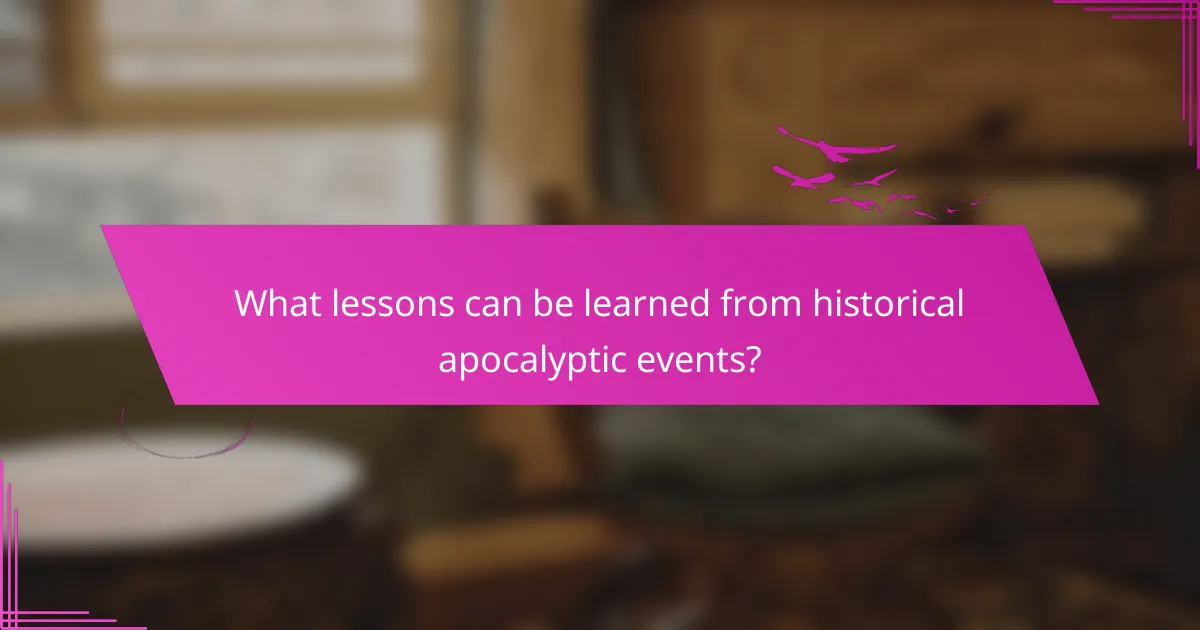
What lessons can be learned from historical apocalyptic events?
Historical apocalyptic events reveal important lessons about human nature and ethical dilemmas. They highlight resilience, moral ambiguity, and the complexities of survival. For instance, during the aftermath of natural disasters, communities often come together, showcasing solidarity. Conversely, scarcity can lead to ethical conflicts, where survival instincts challenge moral principles. These events underscore the duality of human behavior, revealing both altruism and selfishness in crisis situations. Understanding these dynamics can inform contemporary discussions on ethics and societal values in the face of potential future crises.
How have past societies responded to existential threats?
Past societies have often responded to existential threats through adaptation, innovation, and ethical reconsideration. Historical examples reveal diverse strategies for survival and moral decision-making.
In ancient civilizations, such as the Maya, societal collapse due to environmental changes led to a re-evaluation of resource management and social structures. These adaptations reflect a unique attribute of human resilience in the face of crisis.
During the Black Death, European societies grappled with existential dilemmas regarding morality and the value of life. This period prompted shifts in philosophical thought, emphasizing the importance of community and ethical responsibility.
Modern societies face existential threats like climate change and nuclear risk, leading to a resurgence in discussions around ethical implications and collective action. This reflects a rare attribute of contemporary post-apocalyptic philosophy, focusing on sustainability and global cooperation.
What ethical considerations can be drawn from these responses?
Ethical considerations from post-apocalyptic philosophy highlight the struggle between survival and morality. Individuals face dilemmas that challenge their values, such as the balance between self-preservation and altruism. These scenarios reveal fundamental aspects of human nature, including the instinct for cooperation versus competition. The rarity of ethical behavior in dire circumstances often leads to a reevaluation of societal norms and personal ethics. As a result, these reflections can foster deeper discussions about humanity’s capacity for empathy and moral decision-making.
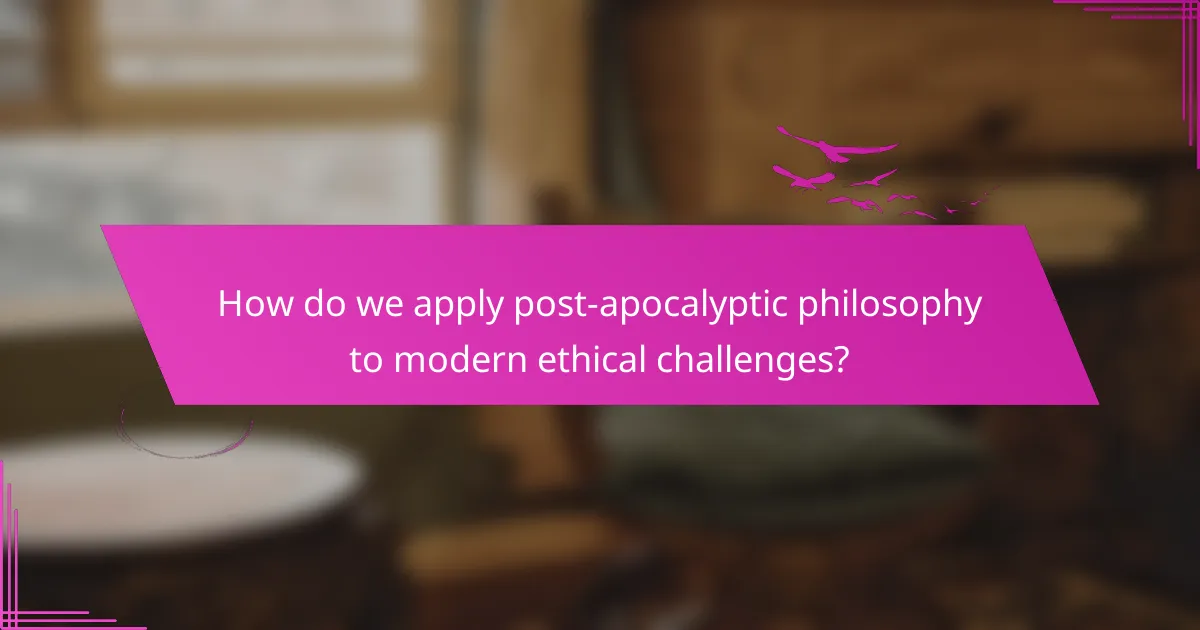
How do we apply post-apocalyptic philosophy to modern ethical challenges?
Post-apocalyptic philosophy offers insights into modern ethical challenges by emphasizing survival, community, and moral responsibility. This philosophy encourages critical reflection on human nature and societal values. It highlights the importance of cooperation in resource-scarce environments, suggesting that ethical frameworks should prioritize collective well-being. Additionally, it challenges individuals to consider the implications of their decisions on future generations, fostering a sense of accountability. By examining these themes, we can develop a more nuanced understanding of contemporary moral dilemmas.
What parallels exist between fictional scenarios and current global issues?
Fictional scenarios often reflect current global issues, highlighting ethical dilemmas and human nature. For example, post-apocalyptic narratives explore survival, resource allocation, and moral choices under extreme conditions, mirroring real-world crises like climate change and pandemics. These stories serve as cautionary tales, prompting reflection on societal values and individual responsibilities. They reveal how fear, desperation, and hope shape human behavior, emphasizing the need for ethical frameworks in times of crisis.
Which strategies can enhance ethical decision-making today?
To enhance ethical decision-making today, individuals can adopt several strategies. First, fostering open dialogue encourages diverse perspectives, which can illuminate ethical dilemmas. Second, implementing frameworks like utilitarianism or deontology helps structure decision-making processes. Third, promoting empathy allows individuals to consider the emotional impact of their choices on others. Lastly, continuous education on ethics ensures that individuals remain informed about evolving moral standards.
What common mistakes should be avoided when navigating ethical dilemmas?
Avoiding common mistakes when navigating ethical dilemmas is crucial for sound decision-making. Key errors include oversimplifying complex situations, neglecting the perspectives of affected individuals, and failing to consider long-term consequences.
Additionally, relying solely on personal biases can skew judgment. Engaging in groupthink may also lead to poor choices. Lastly, ignoring established ethical frameworks can result in inconsistent reasoning.
